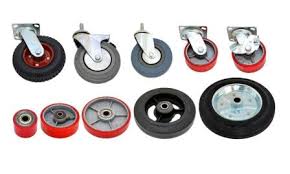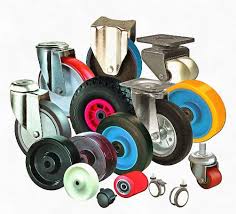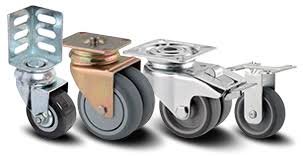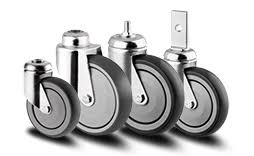- Introduction to constructive mobility elements
- A variety of materials for wheeled systems
- Design features of wheeled elements
- Types of fasteners of wheeled supports
- Classification by carrying capacity
- Specialized solutions
- Areas of use of wheeled systems
- Optimal solution selection criteria
- Prospects for the development of technology
- Conclusion and recommendations
Hardware wheels and wheel supports are important elements, providing equipment mobility, furniture, carts and industrial structures. They differ in the material, design, carrying capacity and operating conditions. Consider the basic hardware wheels и колесных опор, Their features and the scope of application.
Introduction to constructive mobility elements
Modern industrial and household equipment cannot be represented without mobile solutions. Hardware wheels and wheel supports form the basis of mobile systems, ensuring the functionality and ease of operation of various structures. These elements play a key role in logistics, production, medical sphere and everyday life, Determining maneuverability, carrying capacity and durability of equipment.
Main characteristics, which should be considered when choosing wheeled systems:
- carrying capacity;
- Type of the working surface;
- Operating conditions;
- Demands for maneuverability;
- The need for additional functions.
A variety of materials for wheeled systems
Production material determines the operational characteristics of the wheel, their wear resistance and scope. Modern manufacturers offer a wide range of solutions for various working conditions.
The most common execution materials:
- полиуретан – отличается высокой износостойкостью и бесшумностью движения;
- резина – обеспечивает отличную амортизацию и плавность хода;
- нейлон – демонстрирует устойчивость к химическим воздействиям;
- Thermoplastic elastomers (TPE) – сочетают преимущества резины и полиуретана;
- чугун и сталь – используются для экстремальных нагрузок;
- полипропилен – легкий и химически стойкий вариант.

Design features of wheeled elements
The design of the wheels determines their functionality and the sphere of application. Manufacturers are constantly improving technical solutions, Offering specialized options for specific tasks.
Basic constructive varieties:
- цельнолитые – монолитные системы с максимальной прочностью;
- пневматические – с воздушной камерой для амортизации;
- суперэластичные – с пенным наполнителем вместо воздуха;
- двухкомпонентные – с отдельным ободом и протектором;
- ребордные – с защитным бортом для направленного движения.
Types of fasteners of wheeled supports
Wheel supports differ in the method of installation and functionality. The correct selection of fastening ensures the stability and handling of equipment.
Options for constructive support of supports:
- поворотные – с вращающейся платформой для маневрирования;
- жестко закрепленные – для прямолинейного движения;
- тормозные – с механизмом фиксации положения;
- подпружиненные – с амортизацией вертикальных нагрузок;
- регулируемые – с возможностью изменения высоты.
Classification by carrying capacity
Carrying capacity is a key parameter when choosing wheeled systems. Manufacturers offer solutions for various weight categories of equipment.
Gradation by load capacity:
- легкие системы – до 50 kg for furniture and small -sized equipment;
- средний класс – 50-200 kg for industrial carts;
- тяжелые варианты – 200-1000 kg for warehouse equipment;
- сверхмощные решения – свыше 1000 kg for special equipment.
Specialized solutions
For work in special conditions, specialized wheel systems with unique characteristics have been developed. These solutions take into account the specific requirements of various industries.
Special types of wheeled systems:
- антистатические – для электронной промышленности;
- термостойкие – для высокотемпературных сред;
- химически стойкие – для агрессивных сред;
- пищевые – для предприятий пищевой промышленности;
- взрывобезопасные – для опасных производств;
- безмаркие – для деликатных покрытий.

Areas of use of wheeled systems
The scope of the use of wheeled solutions covers almost all industries and the household sphere. Each area makes special requirements for equipment characteristics.
The main directions of application:
- Warehouse logistics and loading equipment;
- Medical equipment and furniture;
- industrial machines and production lines;
- Trade equipment and windows;
- Office furniture and household structures;
- Airport and hotel equipment;
- agricultural equipment and inventory.
Optimal solution selection criteria
The correct selection of wheeled systems requires a comprehensive analysis of working conditions and functional requirements. Competent choice ensures the durability and efficiency of operation.
factors, influencing the choice:
- The intensity of operation;
- The nature of the transported goods;
- Coating type and condition;
- The temperature mode of operation;
- Demands for maneuverability;
- The need for additional functions;
- Aesthetic requirements.

Prospects for the development of technology
Manufacturers are constantly working on improving wheeled systems, introducing innovative materials and constructive solutions. The future of the industry is associated with the development of intellectual systems.
Directions of technological development:
- “умные” колеса с датчиками нагрузки;
- Self -orienting systems;
- energy -generating solutions;
- Nanomodified materials;
- Biometric constructions;
- Environmentally friendly composites.
Conclusion and recommendations
The modern market offers a huge variety of wheeled systems for any tasks. Understanding the features of various solutions allows you to make the optimal choice for specific operating conditions. When selecting equipment, it is recommended to consult with specialists and take into account not only current needs, but also the prospects for the development of technology. Качественные колесные системы – это инвестиция в эффективность и долговечность вашего оборудования.












